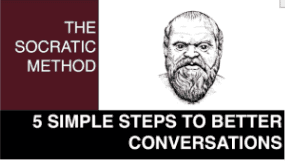
American summer tour! Wooclap will be at InstructureCon 2025
Come say hi at booth 41 from July 22nd to July 24th in Spokane, Washington
What is the Socratic Method?
📌 The Socratic method is a teaching approach built around guided dialogue where thoughtful questioning drives learning rather than direct instruction. Imagine a classroom where, instead of lecturing, the teacher facilitates a carefully crafted conversation by posing thought-provoking questions that encourage students to examine their assumptions and articulate their reasoning. This method transforms learning from passive reception into an active intellectual journey where students discover insights through their own critical thinking[1][2][3].
📜 ORIGINS: Named after the ancient Greek philosopher Socrates (470-399 BCE), this approach emerged in 5th century Athens as an alternative to the dominant rhetorical teaching styles of that era[4][5][6]. Socrates engaged fellow citizens in philosophical dialogues where his persistent questioning exposed contradictions in their thinking, challenging them to refine their ideas. The approach was preserved through Plato's dialogues, which documented his teacher's distinctive inquiry-based method[1][4].
⚙️ MECHANICS: Unlike conventional teaching that delivers pre-packaged information, the Socratic method operates by systematically probing understanding through layers of questions[3][7]. The teacher typically feigns ignorance (the "Socratic pose") to encourage student participation, then uses clarifying questions to explore concepts, questions that examine assumptions, and questions that analyze implications[3][8]. The process deliberately reveals contradictions in reasoning, guiding participants toward more coherent understanding through their own intellectual effort rather than through direct instruction[1][7].
🌐 MODERN APPLICATIONS: Today, the Socratic method extends far beyond philosophy classrooms. Law schools famously employ it to develop students' analytical reasoning and ability to articulate arguments under pressure[9][10]. Medical education uses it to enhance diagnostic reasoning[11][12], while business schools apply it to case studies and problem-solving scenarios[2][13]. The method has also been adapted for psychotherapy, where therapists use Socratic questioning to help patients examine their thought patterns[1][9]. In each context, the fundamental principle remains: learning occurs most deeply when people actively reason their way to conclusions rather than passively receiving information[7][14].
Sources —
[1] https://en.wikipedia.org/wiki/Socratic_method
[4] https://conversational-leadership.net/history-socratic-method/
[6] https://iep.utm.edu/socrates/
[7] https://www.britannica.com/topic/Socratic-method
[8] https://repository.stcloudstate.edu/cgi/viewcontent.cgi?article=1137&context=sped_etds
[9] https://oceanostherapy.com/the-socratic-method-a-timeless-approach-in-modern-psychotherapy/
[11] https://www.alu.edu/alublog/understanding-the-socratic-method-of-teaching/
[12] https://pmc.ncbi.nlm.nih.gov/articles/PMC4174386/
[13] https://owis.org/sg/blog/student-inspired-learning-the-socratic-approach/
[14] https://sphero.com/blogs/news/socratic-teaching-method-in-stem
A monthly summary of our product updates and our latest published content, directly in your inbox.



